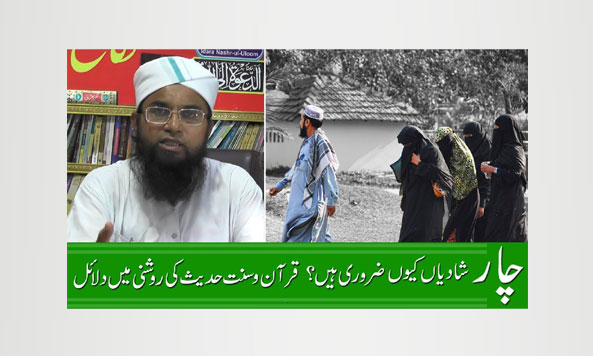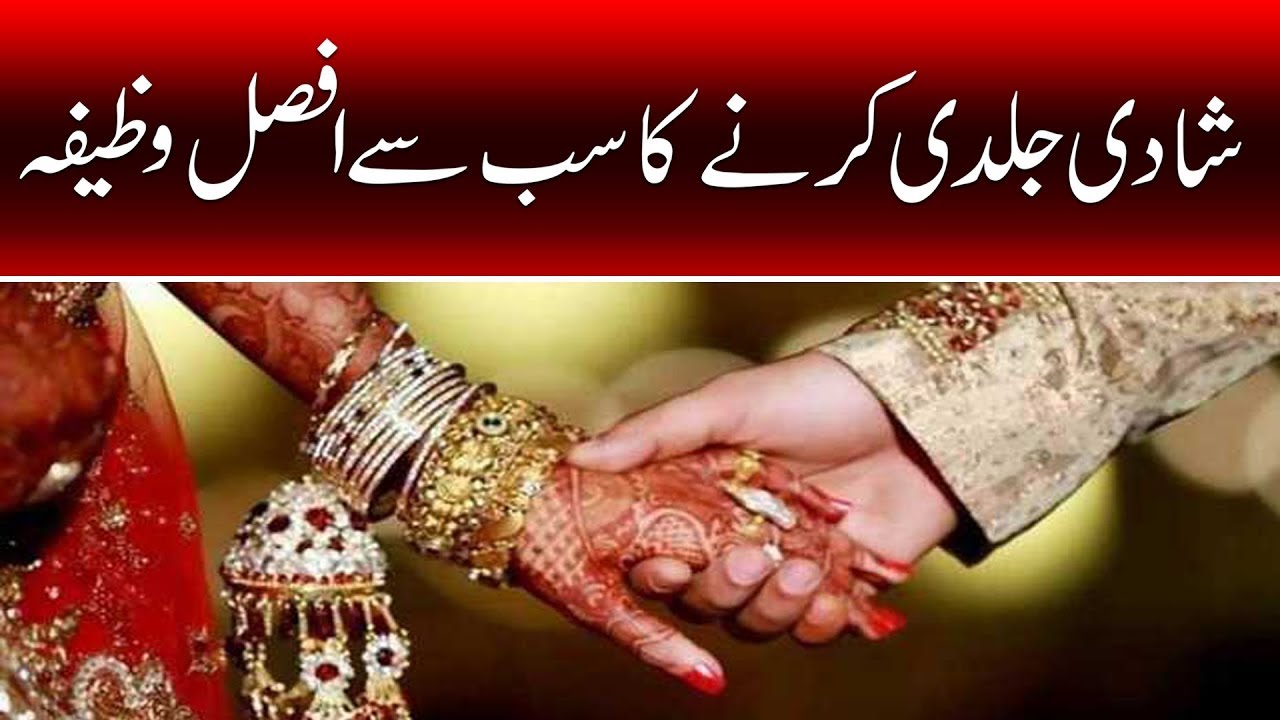Zaroorat Rishta
طلاق کی وجہ کیا ہے اور طلاق سے کیسے بچا جائے؟

برائے مہربانی کمنٹس میں اپنا ڈیٹا دینے کی بجائے اس لنک پرمکمل رجسٹریشن فارم پُر کریں اور اپنی فری رجسٹریشن کروائیں. تازہ تصویر لازمی اٹیچ کریں۔ آپ کا ڈیٹا ہمارے پاس محفوظ ہوگا اور ہم خود آپ سے رابطہ کریں گے۔یہ لنک ہے ۔
- What is nikah? “Nikah literally means conjunction or uniting. In the Islamic legal system, it implies a marriage contract in the presence of a minimum of two males.” At-Tirmidhi Hadith 3096 Narrated by Anas ibn Malik Allah’s Messenger (peace be upon him) said, "When a man marries he has fulfilled half of the deen; so let him fear Allah regarding the remaining half.”
- Divorce in Islam involves the pronouncement by a husband of the Arabic phrase ṭalāq (lit. "I divorce you”) to his wife. What is divorce? “The most hated thing before Allaah is divorce.”
- TALAQ [308] It means repudiation of marriage by the husband. It is peculiar because Muslim Husband has unrestricted right to divorce without giving any reason. Muslim law does not require the existence of any fault or matrimonial offence as an excuse for divorce. It is applicable where it is impossible for the spouses to live together so they must separate peacefully. However, an indirect check upon this right is the obligation of husband to pay the dower upon the dissolution of marriage.
- CONDITIONS FOR A VALID TALAQ: 1. Free Consent: Except under Hanafi law, the consent of the husband in pronouncing Talaq must be free. Under Hanafi law, a Talaq pronounced under compulsion, coercion, undue influence, fraud and voluntary intoxication etc. is valid and dissolved the marriage. However, even under Hanafi law Talaq pronounced under forced or involuntary taxation is also void. 2. Formalities: Sunni Law: (a) Talaq may be in oral or in writing. (b) No particular word is required to constitute Talaq but the expression should clearly indicate the husband’s desire to dissolve the marriage. (c) It need not be made in presence of witnesses. Shia Law : (a) Talaq must be pronounced orally except where husband is unable to speak. (b) It must be pronounced in the presence of two competent witnesses (i.e. every Muslim male who has attained the age of puberty and is of sound mind). Moreover in place of one male two adult female of sound mind may be substituted. (c) It requires the use of specific Arabic words in the specific formulae in the pronouncement of Talaq. 3. Express words: The words of Talaq must clearly indicate the husband’s intention to dissolve the marriage. So the pronouncement must be express.
- Presence of wife: The presence of wife at the time of pronouncement of Talaq is necessary. The name of wife must be specifically referred in the pronouncement. Where the husband has more than one wife he must specify and name the wife against whom he is pronouncing Talaq. 5. Notice of Talaq: It is not necessary for husband to communicate the pronouncement of Talaq to wife. Talaq becomes effective from the moment of pronouncement and not from the time when the wife comes to know. 6. Conditional and Contingent Talaq : Sunni Law: A Talaq may either be absolute(i.e. unconditional) or subject to a condition or contingent(dependent upon happening of an uncertain future event). A conditional or contingent Talaq becomes effective only upon fulfillment of the condition or happening of future event. However the condition must not be unIslamic. Shia Law : A conditional or contingent Talaq is void and ineffective.
- Talaq -ul- sunnat – It is a Talaq which is effected in accordance with the traditions of Prophet. It is further divided in two types – Ahasan and hasan. Ahasan – It is the most approved and considered to be the best kind of Talaq. The word ahasan means best or very proper. To be of Ahasan form, it must satisfy the following conditions – 1.the husband must pronounce the formula of divorce in a single sentence. 2.the pronouncement of divorce must in done when the wife is in state of tuhr (purity), which means when she is free from her menses. 3.husband must abstain from intercourse for the period of iddat. Pronouncement in this form is revocable during the period of iddat. Such revocation may be either express or implied. It becomes irrevocable at the expiry of iddat. Shia-Written Talaq is not acceptable unless the husband is unable to speak. Two male witnesses are required. Intention to divorce is required on the part of husband. Sunni -Written Talaq is acceptable. No witnesses are required. Talaq pronounced even by mistake is binding.
- Hasan – Hasan in Arabic means "good” and so this form of Talaq is considered to be a good form of Talaq but not as good as Ahasan. To be in this form, it must satisfy the following conditions – 1.There must be three successive pronouncements of the formula of divorce. 2.In case of a menstruating wife, the three pronouncements must be made in three consecutive tuhrs. 3.In case of a non-menstruating wife, the three pronouncements must be made during the successive intervals of 30 days. 4.No sexual intercourse must take place during these three periods of tuhr. It can be revoked any time before the third pronouncement. It becomes irrevocable on the third pronouncement. “A divorce is only permissible twice: after that, the parties should either hold together on equitable terms, or separate with kindness.
- Talaq -ul- biddat It is a disapproved and sinful form of Talaq. It was introduced by Ommeyyads in order to escape the strictness of law. To be of this form, it must satisfy the following conditions – 1.three pronouncements may be made during a single tuhr either in one sentence (e.g. "I divorce thee thrice.” ) or in three sentences (e.g. I divorce thee, I divorce thee, I divorce thee). 2.a single pronouncement made during a tuhr clearly indicating an intention to dissolve marriage irrevocably (e.g. "I divorce thee irrevocably”). It becomes irrevocable immediately when it is pronounced irrespective of iddat. Thus, once pronounced, it cannot be revoked. One a definite complete separation has taken place, they cannot remarry without the formality of the woman marrying another man and being divorced from him. Shia – Shias and Malikis do not recognize this form. Shia law does not recognize any form of irrevocable Talaq. Sunni- Recognized but considered sinful.
- Ila (Vow of continence) – Where the husband is of sound mind and of the age of majority, swears by God that he will not have sexual intercourse with his wife and leaves the wife to observe iddat, he is said to make ila. If the husband after having pronounced Ila abstains from having sexual intercourse with wife for four months, the marriage is dissolved with the same result as if there had been an irrevocable divorce pronounced by the husband.
- Zihar Injurious Assimilation – If a husband compares the wife with his mother or any other female relative within prohibited degree, the wife has a right to refuse herself to him until he has performed a penance such as freeing a slave or fasting for a month. In default of expiation by penance, the wife has the right to apply for judicial divorce. Legal Effects – Zihar by itself does not terminate the marriage nor does it cause the wife to lose her right to maintenance even in case of default of penance. It causes the following – 1.sexual intercourse becomes unlawful 2.husband is liable for penance 3.wife can claim judicial separation if the husband persists in wrong doing.
- Shia- Comparison must have been done in presence of two witness. Muta marriage may be dissolved by Zihar. The comparison must be done intentionally and with disrespect. If the husband makes a comparison to show respect to his wife, an expiation is not necessary. This form has become obsolete. Sunni- No such requirement. “Divorced women shall be maintained on a reasonable scale. This is a duty on the righteous.” (Qur’an 2:241)
- Talaq -E- tafweez A husband may delegate his power to give Talaq to any third party or even to his wife. This delegation is called tafweez. An agreement made either before or after the marriage providing that the wife is at liberty to divorce herself from her husband under certain specified conditions (e.g. husband taking a second wife), is valid, provided that such power is not absolute and unconditional and that the conditions are reasonable and are not opposed to public policy. Note that a wife does not divorce her husband but gets herself divorced from the husband. Ameer Ali gives three kinds of tafweez – (This is given in Aqil Ahmed’s book. I have no idea what is the difference between the three). Ikhtiar – giving her authority to Talaq herself. Amr-bayed – leaving the matter in her own hands. Mashiat – giving her the option to do what she likes. This does not deprive the husband from his right to give Talaq. Talaq e taliq It means contingent divorce. Under the Hanafi law, pronouncement of divorce may take effect immediately or at some future time or event.
- Khula Divorce at the request of wife – A wife has a right to buy her release from marriage from her husband. It must satisfy the following conditions – 1.there must be an offer from the wife. 2.the offer must be accepted with consideration (evaz) for the release. 3.the offer must be accepted by the husband. It becomes effective as well as irrevocable (Talaq ul bain) as soon as it is accepted by the husband and the wife is bound to observe iddat. As a consideration for release by the husband, everything that can be given in dower can be given. If the wife fails to give the consideration that was agreed upon at the time of Khula, divorce does not become invalid but the husband has the right to claim the consideration. Shia Husband must be adult, sane, free agent (mukhtar), and must have intention to divorce her. Husband has no power of revocation but wife can reclaim the consideration during iddat. In this case, the husband can revoke Khula. Sunni Only two conditions – Husband must be adult and sane. It is irrevocable and partners cannot resume sexual intercourse until a fresh marriage is arranged.
- Mubarat Divorce by mutual agreement – It is a form of dissolution of marriage contract, where husband and wife both are averse to the marriage and want to separate. It requires following conditions – 1.Either of husband or wife can make the offer. 2.The other one must accept it. 3.As soon as it is accepted, it become irrevocable and iddat is necessary. Since it is a mutual agreement, there is no question of consideration. “And women shall have rights similar to the rights of men against them, in kindness, according to what is equitable; but men have a degree (of advantage) over them. And God is Exalted in Power, Wise.”
- Judicial Divorce – Section 2 of Muslim Marriage Dissolution Act 1939 This gives the following grounds to wife belonging to Shia as well as Sunni sects, upon which she can ask for divorce – 1.Absence of husband – 4 yrs. Decree passed on this ground will take affect only after 6 months of passing and if the husband shows up during the 6 months he can request the court to set the decree aside. 2.Failure to maintain – for 2 yrs. Cause is immaterial. Poverty, incapacity is no excuse. There is no agreement among HCs regarding the conduct of wife.. 3.Imprisonment of husband – for 7 yrs or more. 4.Failure to perform marital obligations – for 3 yrs 5.Impotency of husband – If the husband was impotent at the time of marriage and continues to be so. 6.Insanity, leprosy, or venereal disease – For insanity, 2 yrs are required. For disease, no time period is required.
- Repudiation of marriage – If the wife was married before she was 15, she can repudiate the marriage before she turns 18. 8.Cruelty of husband – cruelty involves – habitual assault, associates with women of bad repute, attempts to force her to lead immoral life, disposes off her property, obstructs her practice of religion, does not treat all his wives equally. 9.Grounds allowed by Muslim law – This covers all the grounds such as Ila, Zihar, Khula, and Mubarat, which are provided by Muslim law.
- Consequences arising from Talaq 1.Marriage – Parties are entitled to contract another marriage. If the marriage was consummated the wife has to wait until the period of iddat is over, otherwise, she may remarry immediately. If the marriage was consummated and if the husband had four wives at the time of divorce, he can take another wife after the period of iddat. 2.Dower – Dower becomes payable immediately if the marriage was consummated, otherwise, the wife is entitled to half of the amount specified in dower. If no amount is specified, she is entitled to 3 articles of dress. Where the marriage is dissolved due to apostasy of the wife, she is entitled to whole of the dower if the marriage has been consummated. 3.Inheritance – Mutual rights of inheritance cease after the divorce becomes irrevocable. 4.Cohabitation – Cohabitation becomes unlawful after the divorce has become irrevocable and children from such intercourse are illegitimate and cannot be legitimated.
- Remarriage – Remarriage between the divorced couple is not possible until 1.the wife observes iddat 2.after iddat she lawfully marries another man 3.this intervening marriage is consummated 4.the new husband pronounces divorce or dies 5.the wife again observes iddat A marriage done without the fulfillment of the above is irregular, not void. But mere cohabitation after an irrevocable divorce is void. 6.Maintenance – The wife becomes entitled to maintenance during the period of iddat but not during the iddat of death. “And if he has divorced her [for the third time], then she is not lawful to him afterward until [after] she marries a husband other than him. And if the latter husband divorces her [or dies], there is no blame upon the woman and her former husband for returning to each other if they think that they can keep [within] the limits of God.” (Qur’an 2:230)
- Divorce is dislike by the prophet of Islam. However it is permissible under certain critical condition if wife is disloyal to husband and does not repent or give up her unethical, irreligious and tries to damage the relationship as ordained by God and prophet of Islam ,it is permissible to divorce her with condition as permissible by Quran. Similarly ,if a husband commits the same as mentioned above in the case of wife .She is also liable for khula. In Islamic shariah the relationship of husband and wife is considered pious and efforts must be rendered on the part of relative and society to strengthen their relationship. However in severe conditions between wife and husband,talaq or khula is permissible according to Islamic law.
- Gusse ki haalat me koi faisla mat karo aur agar khush ho to koi wada mat karo. -Hazrat Ali (R.A.)






